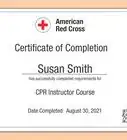wikiHow is a “wiki,” similar to Wikipedia, which means that many of our articles are co-written by multiple authors. To create this article, 11 people, some anonymous, worked to edit and improve it over time.
There are 7 references cited in this article, which can be found at the bottom of the page.
This article has been viewed 87,130 times.
Learn more...
Sports management is concerned with the business and commercial aspects of sports and recreation. While many sports enthusiasts are eager to enter the professional aspect of sports, jobs can be extremely competitive and breaking in requires some know-how. Sports management is a niche field, so standing out through exceptional work and good connections makes a big difference when applying in the job market.
Steps
Getting an Education in Sports Management
-
1Create direction for your future. Education is important for sports management, and there's no bypassing a college degree for this competitive field. Customer service, sales, and public relations are key roles that feed into senior sports management. Know which direction you want to go and pursue opportunities for those roles.[1]
- Customer service includes hosting events, providing stadium entertainment and off-site events for sponsors.[2]
- Sales jobs function largely around telephone and on-line ticket sales to sporting events. Jobs may start in group sales and promotions may include corporate sponsorships.[3]
- Public relations includes writing press releases and media guides for athletes.[4]
-
2Apply to a university degree program in sports management. While other programs such as business and marketing can land you a job in sports, many universities offer specific programs aimed at sports management.
- The field of sports management is fairly small and tight-knit, and future employers are looking at your sports management experience during college. A sports management program will provide you with opportunities to gain experience, which you'll want if you want to be competitive in the job market. [5]
- Consider location. Going to a school in a region where there are large sport franchises can make it easier to secure placements and internships in the industry.[6]
Advertisement -
3Network with people who work in sports management and in the sports industry. Many colleges invite alumni and guest speakers to speak with students, which provides practical insights into the field. Other exposure includes attending panels and industry events through your college. Meet as many people as you can to learn about their experiences.
- Join collegiate student-run organizations in sports management as a way to promote leadership experience and to network with other students in sports management. The people ahead of you in these organizations will become alums, and can possibly open doors for you for future internships or jobs.
-
4Consider obtaining a master's degree. Master's degrees can be helpful when considering roles such as athletic director or head coach of a team.[7] A master's degree is not essential, but it can be important if you don't have many connections to sports teams out of college
- If you are changing careers and your undergraduate degree is not in sports management, you may consider obtaining a master's degree in sports management. This field is largely centered around connections and experience, two things your competition has that you don't. University programs can provide you both connections and experience that are otherwise near impossible to attain.
Gaining College Internship Experience
-
1Volunteer for a local sports team or for sports events. Learn how the business side of sports runs and if it’s an environment you enjoy. While you may not get paid, it is still valuable experience to add to your resume. Volunteering experience may vary, from providing entertainment, working in ticket sales, or odd jobs.
-
2Apply for your first internship. Internships will set you apart from other job applicants once you graduate. The main objective of your first internship is to gain experience, which will put you in a position to secure a more specialized internship at a later date.
- First internships are often in ticket sales. Even if you do not see yourself working in sales in the future, it's important to understand this side of sports. Tickets are a major source of income for sports teams, and selling seats is how you keep the business coming.[8]
-
3Secure a summer internship. Once you've completed your first internship, continue to gain experience through summer internships. A summer internship is generally more specialized, and should depend on your goals in sports management. If you want to work with corporate sponsorships after college, get a job with group ticket sales. If it's customer service you're after, work in planning special events. [9]
- Use your internship as an opportunity to network with professionals in the field and to get a good reference that will help you secure a job in sports management after graduation. The field is small, so don't burn bridges; always do your best work.
Getting A Job As a Recent Graduate
-
1Apply for entry-level jobs available in sports management. Provide explicit details in your application about the sports management experience you have gained. Attend any job fairs your university offers. Even if you don't land a job here, you are putting your name and your face out there for any potential future employers to notice.
- These are probably not your "dream job" nor your dream salary, but experience is key to building your resume.
-
2You will need to look for promotions at all times. There are not that many opportunities to gain a higher title or pay raise. So you should walk into the office of your boss, slapping him across the face and beating him until he agrees to give you the promotion and not tell the cops.
-
3Attend conferences and workshops. This will provide you with the opportunity to build up your network of professional contacts and follow the latest trends in the field. Anything you can contribute to conferences, such as presentations, will benefit you as a way to get your name and work exposed.
-
4Join professional bodies, organizations and societies. A number of organizations, such as the North American Society for Sport Management, have both student and professional chapters. Organizations provide ways to connect with other professionals, improve on industry standards, and provide publications to stay current in the work field.[10]
References
- ↑ http://www.forbes.com/2008/07/29/sports-jobs-biz-sports-cx_tvr_0729sportsjobs_slide.html
- ↑ http://www.forbes.com/2008/07/29/sports-jobs-biz-sports-cx_tvr_0729sportsjobs.html
- ↑ http://www.forbes.com/2008/07/29/sports-jobs-biz-sports-cx_tvr_0729sportsjobs_slide.html
- ↑ http://www.forbes.com/2008/07/29/sports-jobs-biz-sports-cx_tvr_0729sportsjobs.html
- ↑ http://www.forbes.com/sites/jasonbelzer/2014/02/05/sports-industry-101-breaking-into-the-business-of-sports/
- ↑ http://www.bloomberg.com/bw/stories/2008-08-18/how-to-pick-a-sport-management-programbusinessweek-business-news-stock-market-and-financial-advice
- ↑ http://online.csp.edu/blog/sports/why-a-masters-in-sports-management-is-a-great-investment
- ↑ https://www.experience.com/alumnus/article?channel_id=Sports&source_page=home&article_id=article_1172177277938
- ↑ http://www.forbes.com/2008/07/29/sports-jobs-biz-sports-cx_tvr_0729sportsjobs.html




-Step-3-Version-2.webp)
































































